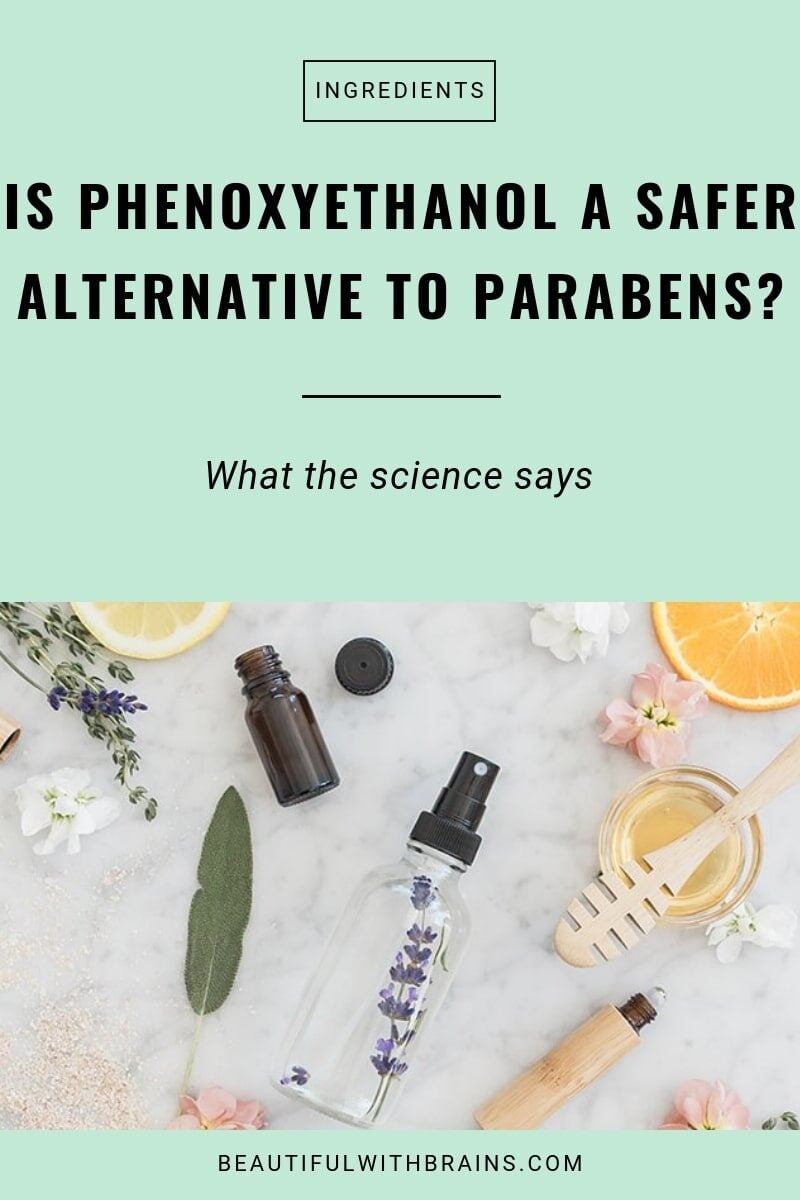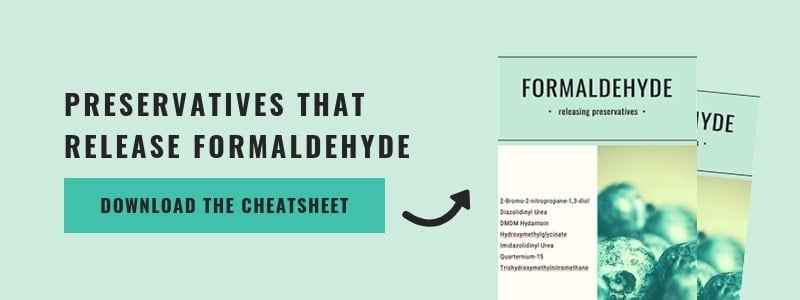
Move over, parabens! There’s a new preservative in town.
It’s called Phenoxyethanol. Rumour has it, it’s gentler, safer and still as effective at keeping bacteria and other nasties out of your skincare products.
Is that too good to be true? Here’s what the science says:
Do You Know Some Preservatives Release Formaldehyde?
Sign up to my newsletter and receive the "preservatives that release formaldehyde" cheat sheet.
What The Heck Is Phenoxyethanol?
Phenoxyethanol is an ethylene glycol ether. An ethanol molecule attached to a phenol group.
In plain English? A preservative with a moisturizing oily texture. It’s usually made in a lab, but you can find it in green tea, too.
Cosmetic chemists love it because it’s so easy to work with. It’s effective in most formulas and pH ranges.
Why Is Phenoxyethanol In So Many Skincare Products?
Blame it on parabens. These popular preservatives have gained such a bad rep (totally undeserved, by the way), a lot of brands are phasing them out and replacing them with something that is seen as safer.
Enter Phenoxyethanol. It’s an antimicrobial agent that kills and inhibits the growth of many Gram-negative and Gram-positive micro-organisms. Studies shows it works against common bacteria, such as E. coli, too.
In other words, it keeps your skincare products safe from most of the bad bacteria and organisms you DON’T want proliferating in them.
P.S. Unlike parabens, Phenoxyethanol is strong against bacteria, but weak against yeast and mold. It should never be the only preservative used in a lotion.
Related: Are Parabens Safe? Here’s What The Science Says
Is Phenoxyethanol Safe For Skin?
The same people who hate on parabens are now starting to hate on Phenoxyethanol, too. For no reason.
Some people just don’t like the idea of having preservatives in skincare products. They’re rather take the chance and use a contaminated cream that gives them an eye infection and makes them go blind…
Yes, that CAN happen when you use preservative-free products. Preservatives are there for a reason: to keep you safe from the micro-organisms that want to harm you. Skip them at your own peril.
Critics say animal studies show Phenoxyethanol causes reproductive and developmental toxicity. What they don’t tell you is how these studies are done: by forcing animals to eat insanely high amount of this preservative!
Heck, even Vitamin C can kill you if you ingest TOO MUCH of it. Does that mean you should never eat an orange?!
If you want to determine if Phenoxyethanol is safe for skin, you have to consider how it’s used on your skin. In skincare products, you can only use 1% or less or Phenoxyethanol.
A 2011 shows low concentrations of Phenoxyethanol are safe even on premature babies (less than 27 weeks old)!
Sure, there’s always the chance Phenoxyethanol can irritate your skin, especially if it’s sensitive. All preservatives can. They’re killers and killers can’t be too gentle.
But reactions to it are rare. Using preservative-free cosmetics, on the other hand, is much, much more dangerous.
Related: Alternatives To Parabens: Which Are Safe And Effective?
Do You Know Some Preservatives Release Formaldehyde?
Sign up to my newsletter and receive the "preservatives that release formaldehyde" cheat sheet.
The Bottom Line
If you’re looking for an alternative to parabens, go with Phenoxyethanol. It’s an effective preservative that keeps bacteria from multiplying in your skincare products – without irritating your skin.
Do you think Phenoxyethanol is a safer alternative to parabens? Share your thoughts in the comments below.


After using a lot of The Ordinary and Paula’s Choice products, which are mostly preserved with Phenoxyethanol, I got horrible rashes like my skin was on fire, and the next day I get little pimples all over my face.
So I made the test used the same active ingredients, but in a formula without Phenoxyethanol and now my skin is back to normal, but each time I reintroduce my skin to a product which contains it I get the same reaction.
It’s annoying because I’m not allergic against Parabens, because what I dislike about Phenoxyethanol is (I know it’s otherwise safe) that it is in almost everything, it really limits choices.
Only option left are products preserved with Potassium Sorbate, Sodium Benzoate, Sodium Anisate and those with Lactobacillus Ferment, the last two are mostly used in “natural” cosmetic products, I’m unsure whether they are really preserving enough or not.
Thank you for this article. I can’t believe that there are people who do not want to have preservatives in their skincare products. I suppose these people live in countries that are very, very, very cold every day of the year. Or they have enough storage space in their refrigerators for their products which do not have preservatives (both skincare and cosmetics). I find products labelled “no preservatives” scary. I do not shy away from parabens, either.